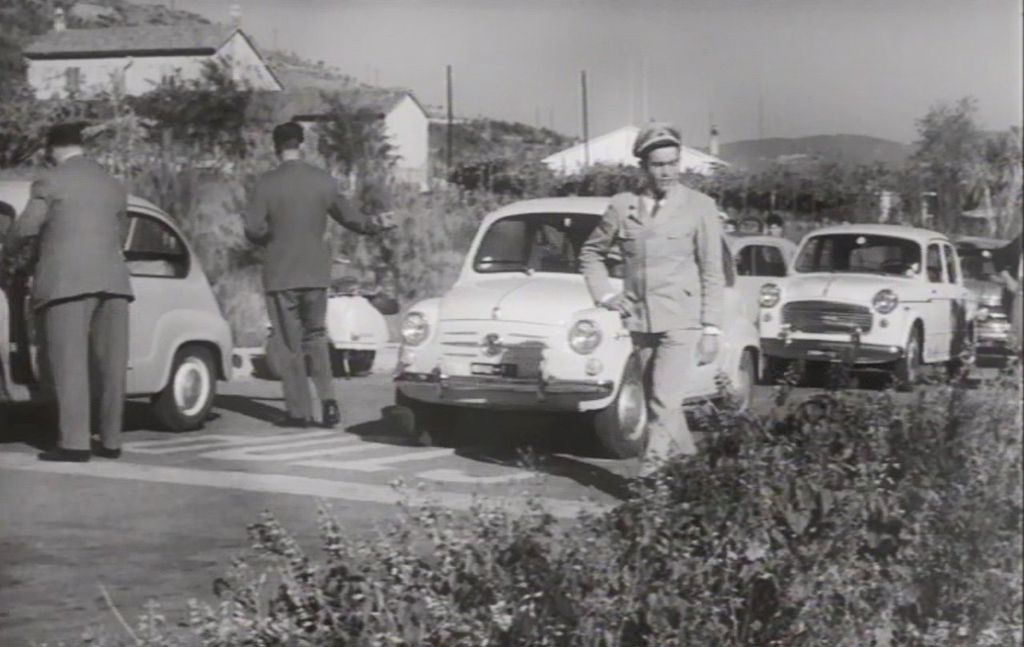Where is the iron curtain?

Director and screenwriter Mako Sajko, who can rightly be classified as one of the classics of Slovenian cinema, was born in 1927 in Tržič. He studied at the High Film School in Belgrade and graduated there in 1959, and at the same time he also trained in Munich and Paris. He began his long and fruitful career as an assistant director for famous Slovenian film directors, such as František Čap and France Štiglic.
Sajko's life path has always been closely connected with moving images. Since 1961, when he set out on his own, he has created a series of short documentaries, mostly based on his own scripts. Moreover, in the 1960s and 1970s, he ranked among the leading documentary filmmakers in Slovenia. His short but meaningful documentaries were all, from the first to the last, a reflection of their time. Mainly because of the chosen topic, they weren’t infamous only in Yugoslavia, but resonated all over the world. With the film "Suiciders, beware!" from 1967, he became notorious in the eyes of the then Yugoslav authorities, so that later the film "Narodna noša" (1975), which was fundamentally not thematically controversial, was not allowed to be shown publicly. At that time, Sajko permanently stopped producing films and instead devoted himself to film education and the projects of young filmmakers. He worked in relative anonymity for several decades until he received the Badjura Lifetime Achievement Award in 2009. After that, interest in one of the undisputed giants of Slovenian cinema grew again.
With his works, Mako Sajko was ahead of his time, as he opened up topics that are still relevant today. His watchful eye and sharp mind constantly discovered various humanistic and sociological aspects.
In 1961, Sajko first recorded the short feature "Maribor Week", and then in the same year he created his documentary debut "Where is the Iron Curtain", which he filmed to a large extent on the border area of Gorizia and Trieste. In the documentary, which does not yet carry a pronounced socially critical tone such as the films of his later production, Sajko does not criticize the cross-border capitalist system, but almost celebrates the situation along the border, which was transitory in this area and offered many benefits to the people living there. This is best supported by a sentence from the film that says: "Instead of it being an iron curtain, as some would like it to be, the border between Italy and Yugoslavia is almost a romantic institution."
The documentary shows scenes from everyday life along the border and the people who cross it in an extremely light and humorous way. The light-hearted atmosphere is additionally supported by humorous music and humorous narration by Sandi Čolnik. The film is dominated by scenes from international and small border crossings, which at that time became a meeting point for people from near and far. Here, Sajko touches on various aspects that characterize this "loose" border; from trading, smuggling, bilingualism and even cross-border love. In this way, he successfully highlights the coexistence of two nations that, despite the border that separates them, breathe together.
Announcements/
Cinema in Udine
07. 01. 2025To discuss the history of cine-club culture in Udine, one must start with Guido Galanti, who in 1930 founded Cine Club Udine—the third cine-club in Italy in chronological order. Alongside him, Renato Spinotti (Dante Spinotti’s uncle) must also be mentioned. In 1934, Cine Club produced the 16mm medium-length film Giornate di sole (Sunny Days), a comedy directed and performed by Galanti, with cinematography by Spinotti. The opening title card featured a hand-drawn depiction of the angel on Udine’s hill and the inscription “La Galanti Film presenta” (Galanti Film Presents). Author: Giorgio Placereani
Trieste – The World in One City
07. 01. 2025Today I will attempt to summarize the development of cinematic culture in Trieste. I will discuss some well-known facts, such as the favourable view of cinema held by Trieste’s writers and intellectuals, or the city’s role as a bridge between Western and Eastern cinema. However, I also want to highlight a less discussed aspect: the presence of women in Trieste’s cinematic culture over the years. Author: Paolo Lughi
Retrospective East/West
27. 11. 2024The East/West Retrospective is part of the official program for the European Capital of Culture GO! 2025. The project aims to reveal the rich cinematic heritage of the cross-border region between Slovenia and Italy to European audiences. The filmography of this region, which explores life along the Slovenian-Italian border, challenges the conventional perception of borders as mere divisions, instead portraying them as vibrant spaces of transition, exchange, and connection.

